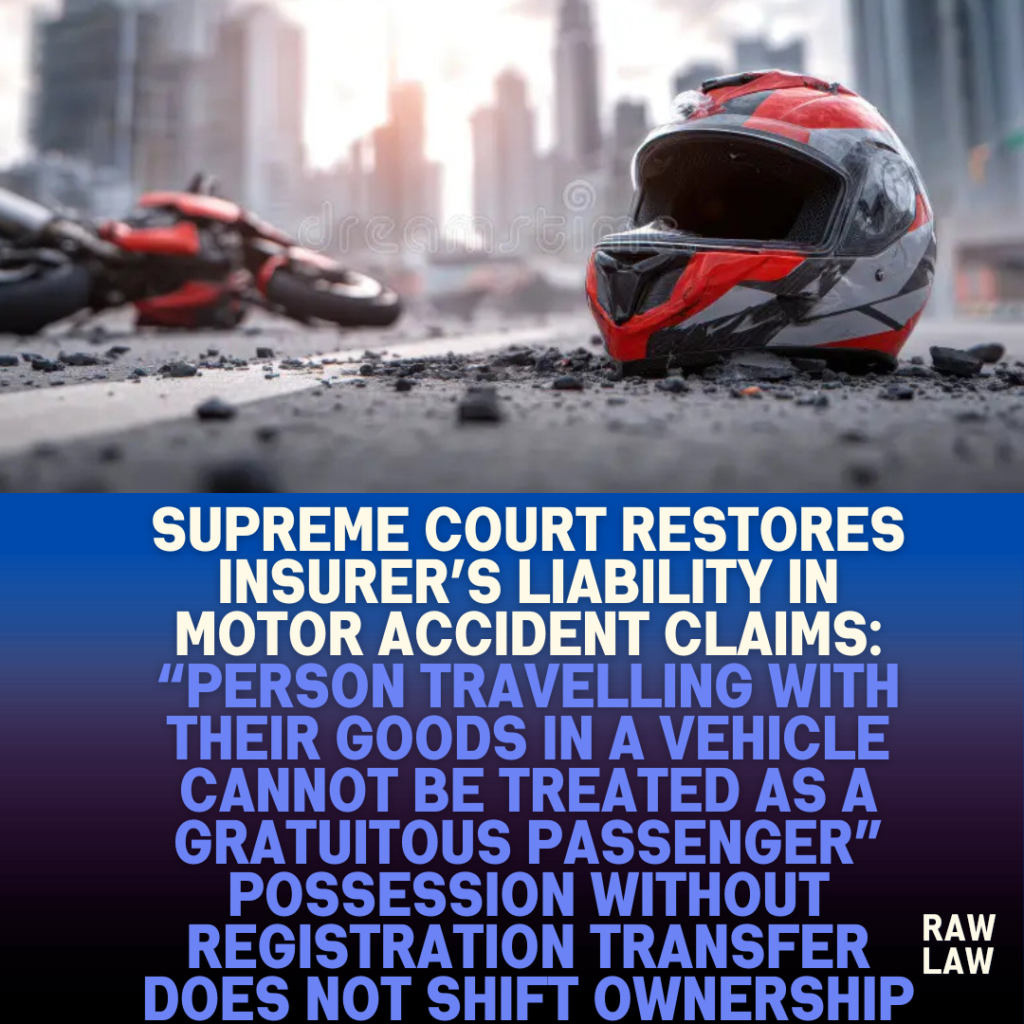Court’s Decision
The Supreme Court allowed the appeals filed by the ostensible owner-driver of a goods vehicle involved in a fatal accident, setting aside the Chhattisgarh High Court’s order absolving the insurance company from liability. The Court held that the registered owner retained legal ownership at the time of the accident, as the transfer was incomplete and unreported under Section 50 of the Motor Vehicles Act, 1988. Consequently, the insurer was bound to indemnify the registered owner. The Tribunal’s awards, including enhanced amounts by the High Court, were directed to be satisfied by the insurer.
Facts
Multiple claim petitions arose from a motor accident involving a goods vehicle, leading to deaths and injuries. The Motor Accidents Claims Tribunal awarded compensation in 11 cases, holding the registered owner, the ostensible owner-driver, and the insurer jointly and severally liable. The insurer challenged three awards, claiming no liability as the victims were gratuitous passengers and the driver-appellant was in possession of the vehicle under a sale agreement with the registered owner.
The High Court upheld the compensation amounts in the claimants’ appeals (enhancing them in two cases) but allowed the insurer’s appeals, holding it free from liability. The appellant, burdened with full liability, sought relief in the Supreme Court.
Issues
- Whether the deceased/injured were gratuitous passengers in the goods vehicle, excluding them from coverage.
- Whether the insurer could be absolved of liability when the vehicle was in possession of the appellant under an uncompleted sale agreement.
- Whether selective challenges to only three out of eleven awards affected the insurer’s liability.
Petitioner’s Arguments
The appellant argued that:
- The victims were petty hawkers transporting goods and were present as owners of the goods, not gratuitous passengers.
- Ownership had not legally transferred to him, as registration remained in the original owner’s name and the sale consideration was incomplete.
- The insurer selectively challenged only three awards, indicating unfairness.
- Relying on Naveen Kumar v. Vijay Kumar (2018) 3 SCC 1, liability must be determined based on the registered owner at the time of the accident.
Respondent’s Arguments
The insurer contended that:
- The victims were gratuitous passengers, excluded from third-party coverage.
- Possession and control of the vehicle had transferred to the appellant, making him liable.
- The appellant had asserted ownership before the Magistrate while seeking release of the seized vehicle, which should fix liability upon him.
Analysis of the Law
Section 147 of the Motor Vehicles Act, 1988 covers liability for death or injury to third parties, including owners of goods or their representatives carried in a goods vehicle. The Tribunal found the victims were accompanying goods for sale, a factual finding the High Court overturned without substantial evidence. Section 50 requires reporting of vehicle transfer to the registering authority within 14 days; no such compliance occurred, meaning legal ownership remained with the registered owner.
Precedent Analysis
- Naveen Kumar v. Vijay Kumar (2018) 3 SCC 1: The Court reaffirmed that liability for third-party claims rests with the registered owner, even after unreported or incomplete transfers, to protect victims from tracing successive transfers. This principle directly applied, fixing liability on the registered owner and, by extension, the insurer.
Court’s Reasoning
The Court found no evidence that the victims were gratuitous passengers. The insurer’s witness admitted ignorance about whether the victims were accompanying goods, and no seizure records or mahazar were produced to disprove the claimants’ testimony. The purported sale agreement was incomplete, with part consideration unpaid and no registration transfer. The appellant merely had possession, not ownership. The High Court’s reversal of the Tribunal’s finding on gratuitous passengers was “perfunctory and without material.” The insurer’s selective appeal strategy further weakened its position.
Conclusion
The Supreme Court restored the Tribunal’s findings, holding that the insurer was liable to indemnify the registered owner for the awards in question. The awards, including enhanced amounts by the High Court, must be satisfied by the insurer. Two appeals relating to claims settled in Lok Adalat were dismissed as infructuous.
Implications
This judgment reinforces that:
- The registered owner remains liable for third-party claims until proper legal transfer under the MV Act is completed.
- Accompanying goods in a goods vehicle qualifies a person as covered under third-party insurance.
- Insurers cannot evade liability on technical grounds without evidence.
- Selective appeals by insurers may be viewed unfavourably, especially where liability principles are uniform.
FAQs
1. Does third-party insurance cover owners of goods in a goods vehicle?
Yes. Section 147 of the MV Act covers death or injury to third parties, including owners of goods or their authorised representatives in the vehicle.
2. Who is liable when a vehicle has been sold but registration is not transferred?
The registered owner remains liable for third-party claims until the transfer is reported and recorded as per Section 50 of the MV Act.
3. Can insurers deny liability by claiming victims were gratuitous passengers?
Not without clear evidence. If victims were accompanying goods, they are covered, and the insurer must indemnify the liability.
